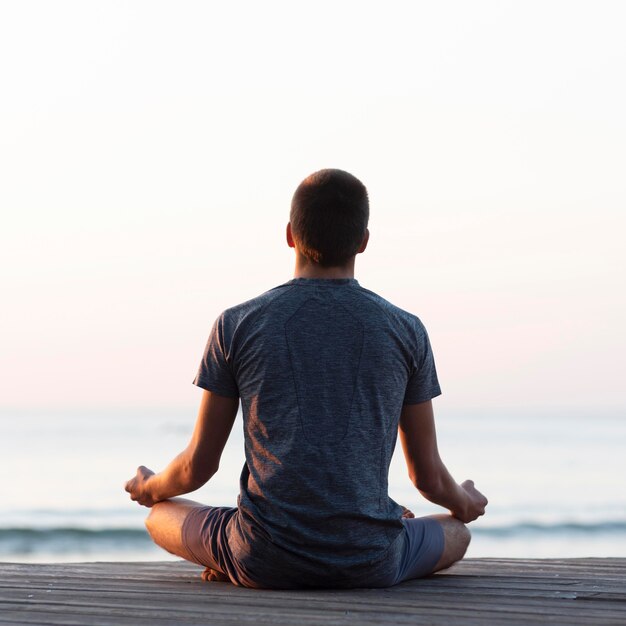One technique that can help you unwind and manage stress better is meditation. There are numerous other potential health benefits as well. Finding the time to meditate regularly isn’t always simple, even if you’ve loved the practice in the past.
Does the time of day you spend meditating affect the advantages or impacts it has on your health—mind, body, and soul? The best time to meditate for many people can be in the morning. However, meditation can be beneficial to your mind and health at any time of day, even if you are unable to incorporate it into your daily practice.
This article will discuss when it’s okay to meditate, why setting aside time for meditation is important, and provide some guidance on making meditation a regular habit.
How and when to meditate
What time of day is optimal for meditation, then? While it’s important to pick a time that fits in with your schedule, there can be specific windows of opportunity to get the most out of your meditation practice.
Meditation in the morning
Starting the day with a morning meditation can be a great way to establish a positive attitude. You frequently have the focus and clarity to concentrate entirely on meditation during these early morning hours, when work, family, and other commitments haven’t yet begun to compete for your time and attention.
Your goals and preferences may determine how long you should meditate, but even just five minutes can help you get started in a healthy way each day.
You may maintain a calm and optimistic state of mind that will enable you to manage any stress that may arise during the day by practicing meditation to establish your objective for the day.
Meditation during your lunch break
If you struggle to find time in the morning for meditation, you might want to try practicing it over your lunch break. This can be an excellent method to rejuvenate for the day ahead of work and take a much-needed break from it.
To get the most out of your midday meditation, find a peaceful area. If you’re at work, you might need to move from your cubicle or desk to locate an adjacent conference room or unoccupied office. Consider sitting on your porch or in your backyard if you work from home.
Meditation in the evening
Meditating at the end of the day can help you unwind and get ready for a restful sleep. This can be especially beneficial if you struggle to fall asleep or find yourself dwelling on the day’s events right before bed.
Try spending ten to twenty minutes in meditation before bed if you usually have problems falling asleep. In order to help you unwind and go off to sleep, you might also wish to concentrate on breathing techniques or listen to a guided meditation.
Meditation when you get home from work
Many people find that they are most likely to feel pressured right after work. This can make it difficult to unwind and may encourage unhealthy coping strategies like binge eating or drinking excessive amounts of alcohol.
You can unwind and make a healthy switch from “work mode” to “home mode” with the aid of meditation.
Meditation after a workout
Another excellent strategy for decompressing after a workout is meditation. Spend a few minutes sitting still and concentrating on your breathing if you’ve just been to the gym, yoga class, or running path and are feeling anxious or energized. This might help you mentally concentrate and release any tension you may have had after your workout.
To maximize the benefits of your post-exercise meditation, consider doing it in the same location as your workout. This can assist in tying the relaxation reaction you have while meditating to the location of your workout, which can aid in your post-workout cooling down.
Meditate when you need to relax
Apart from these designated periods of the day, it’s crucial to maintain flexibility and engage in meditation whenever necessary. If you’re experiencing tension or anxiety, take a few minutes to remove yourself from the uncomfortable situation and engage in some mindfulness exercises.
Your mental well-being should always come first when scheduling meditation sessions. Take a moment to be mindful of your breathing and the current moment if you’re feeling stressed, depressed, or overwhelmed.
The greatest time to meditate is whenever you can fit it into your calendar, even if there are many ideal moments. Make mental health a top priority at all times, and practice meditation as necessary.
Meditate whenever you can find time
When you have time in your schedule, that’s the ideal moment to meditate. Finding a time that works for you and making meditation a regular practice is what matters, even though there could be specific periods that are best for it.
A new habit requires time and constant work to form. Selecting a time that supports your perseverance will help you make it simpler. Choose a different time of day to meditate, such as during lunch or in the evening when you’re finishing the day, if you know that doing so in the morning will be challenging. Your chances of making it a long-lasting habit increase with time.
Try listening to a guided meditation on your way to work or while taking a stroll if you find it difficult to meditate at home. Additionally, you may download applications that offer quick, ten-minute meditations that you can perform whenever and anywhere you choose.
The benefits of scheduling meditation time
It’s important to know why meditation might be helpful, in addition to when the optimal time is to meditate.
Though there are several benefits to meditation, the following are some of the most popular ones:
Stress reduction: Reducing stress is one of the main motivations for meditation. Research indicates that practicing mindfulness meditation can assist in reducing the symptoms of illnesses linked to stress, such as chronic pain, depression, and anxiety.
Enhancing sleep: By slowing down your mind and encouraging relaxation, meditation may be able to assist if you have problems falling asleep. Mindfulness meditation has been demonstrated in studies to enhance both the quantity and quality of sleep.
Increasing concentration and focus: Meditating can also assist in enhancing concentration and attention. Regular meditation can help extend your attention span and enhance your capacity to stay focused if you struggle to stay present or are easily distracted.
Other health advantages of meditation include blood pressure normalization, immune system enhancement, and reduced cortisol production. Therefore, give meditation some thought if you’re seeking a technique to enhance your general health and wellbeing.
Why it’s important to schedule meditation time
It’s easy to get sucked into the daily grind and forget to take care of oneself in today’s fast-paced environment. But even a little period of time each day spent sitting still and paying attention to your breathing can make a big difference in your overall mood.
Thus, schedule some time for meditation if you’re looking for a way to enhance your health and wellbeing. How much of a difference it can make might surprise you.
Ways to develop the habit of meditating
It’s crucial to start off slowly and have patience with yourself if you’re new to meditation. Here are some pointers to get you going:
Choose a posture that feels good. You can meditate while seated, reclined, or even upright. Just make sure your physique won’t distract you and that you’re comfortable.
Focus on breathing. After you’ve found a comfortable posture, close your eyes and concentrate on your breathing. Breathe in through your nose and out slowly and deeply.
Observe your thoughts, but concentrate on your breath. It’s common for thoughts to arise during a meditation session. Simply let them go when they do and concentrate again on your breathing.
Start with a shorter session. If you’re just getting started, consider meditating for five to ten minutes per day. You can progressively lengthen your sessions as you become more accustomed to them.
Meditating on a regular basis can help lower stress, enhance sleep quality, and improve general health and wellbeing. Decide on a time that suits you and incorporate it into your daily schedule. Your body and mind will appreciate it.






























